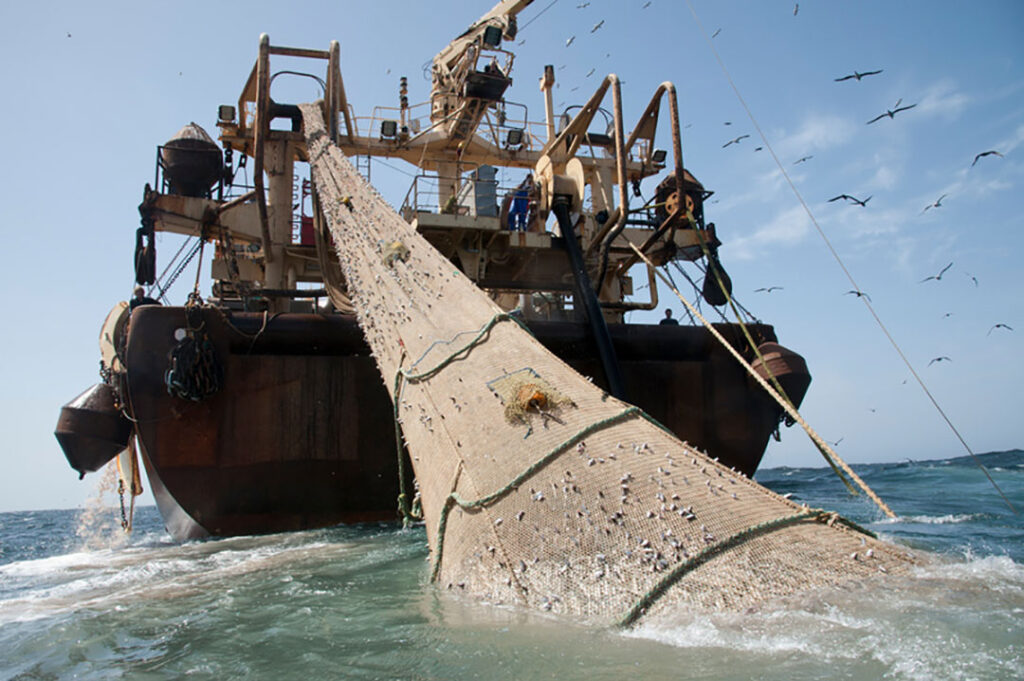ADF STAFF
Liberia’s artisanal fishing community exhaled with relief after its government denied fishing censes to six Chinese supertrawlers capable of decimating the area’s fish stocks.
The 50-meter Chinese vessels with huge nets and sophisticated fish-tracking equipment can catch more than 2,000 metric tons of bottom-dwelling fish annually. That is 4,000 times more than a local artisanal canoe can haul in, according to SeafoodSource. Liberia’s waters are mostly populated by sardinella, marlin, sea bream, croakers and marine catfish.
Emma Metieh-Glassco, director general of the National Fisheries and Aquaculture Authority, said in a statement that licenses for the supertrawlers to fish outside China’s economic exclusion zone had expired.
“The six gigantic vessels that came to Liberia have larger fishing capacities, and such vessels have never come to Liberia to fish,” Metieh-Glassco said. “Liberia cannot issue licenses to those vessels when the flag state has not authorized the vessels to operate on distance waters; it [would] be a [breach] of international protocols.”
Roughly 37,000 people work full or part time in Liberia’s fishing industry, and 80% of the population relies on fish for protein. Local fishermen protested when the large Chinese vessels arrived in July. Similar situations unfolded this year in other West African nations, including Ghana and Senegal.
“We are deeply grateful that the decision has been taken to prioritize the development of small-scale fishers and avoid giving access to large industrial supertrawlers,” Jerry Blamo, president of the Liberia Artisanal Fishermen’s Association, said in a statement. “This will give Liberian fishers the chance to fish sustainably to feed their families and the country, not only now but for generations to come.”
The Environmental Justice Foundation (EJF), which is working to establish a program that helps fishing communities and authorities work together to eradicate illegal fishing, applauded Liberia’s decision.
“The decision to refuse licenses to these supertrawlers is an important milestone in the sustainable management of Liberia’s fisheries,” foundation Executive Director Steve Trent said in a statement. “EJF further commends the transparent process undertaken by Liberia to consider these licenses. It sends a clear message across West Africa that states in the region can prioritize local fishing communities to protect the marine environment and the jobs and food security that it supports.”
Similar scenarios have occurred in Ghana and Senegal.
The Ghana National Canoe Fishermen Council opposed the arrival of three Chinese trawlers in May. Under the government’s Fisheries Management Plan, the country can sustain up to 47 fishing trawlers, but 76 vessels were licensed to fish in Ghana at the end of 2019, the fishermen said in an open letter.
“We are deeply concerned by this development,” the council said. “Our fish stocks in Ghana are in crisis, and the small pelagic fishery — the lifeline of our artisanal fishing communities — is on the verge of collapse.”
Ghanaian fishermen were incensed when their government relicensed a Chinese trawler that had an outstanding $1 million fine for using illegal nets in 2019. The fine had not been paid when the same trawler was fined by Ghanaian authorities again in May, SeafoodSource reported.
In June, Senegal publicly rejected the applications of 52 Chinese trawlers, but pressafrik.com, an online newspaper based in Dakar, reported that the government issued licenses to three fishing vessels in a Chinese fleet previously caught fishing illegally in Djibouti. The report was later confirmed by Greenpeace, the nongovernmental environmental organization.

